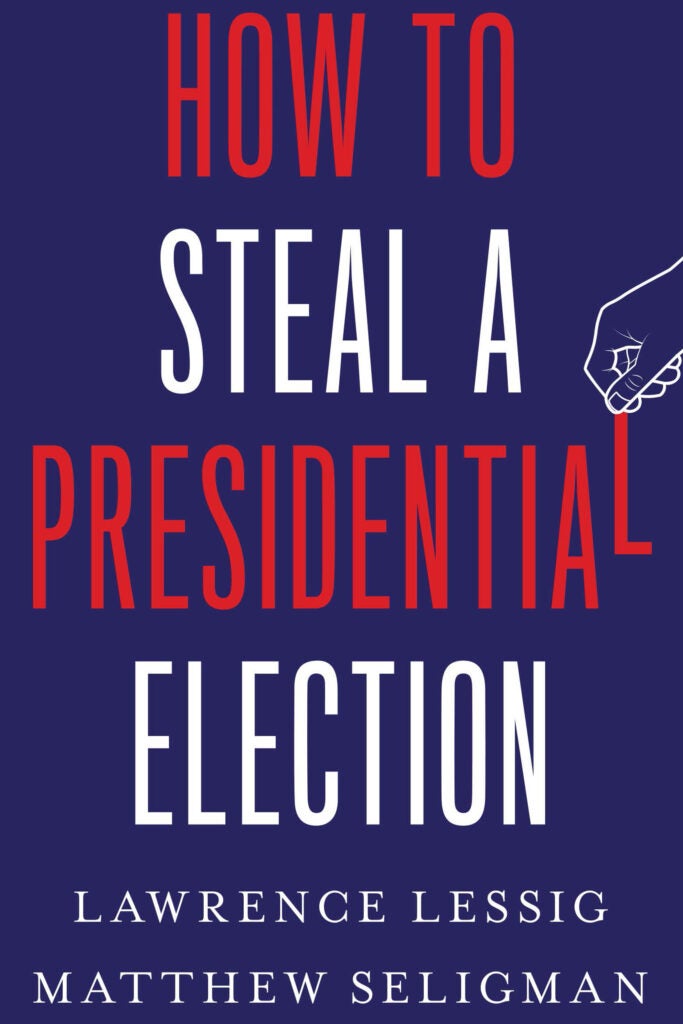
Lawrence Lessig (left) and Matthew Seligman.
Election theft 101: Foster skepticism
Two legal scholars, stunned by Jan. 6 insurrection, game out half-dozen possible schemes that exploit, spotlight flaws in system
Excerpted from “How to Steal a Presidential Election” by Lawrence Lessig, Roy L. Furman Professor of Law and Leadership, and Matthew Seligman, Climenko Fellow ’18.
For many years, Republicans have criticized America’s administration of elections. They have insisted for decades that elections across the country are marred by widespread voter fraud. In response to those allegations — never sustained with any solid empirical evidence — they have implemented techniques to remove voters from the voting rolls and to restrict access to voting. We won’t name the motives for these efforts. We can only affirm the result: In the year after President Biden took office in 2021, 18 states passed 34 voting restriction laws. Many of these new laws became possible because the Supreme Court’s decision in 2013 in Shelby County v. Holder struck down key provisions of the Voting Rights Act. Every one of the laws passed the state legislature on a party-line vote. Although the precise partisan effects of these laws will emerge only over time, the fear is that those laws will disproportionately disenfranchise demographics that tend to vote Democratic.

That longtime trend culminated in 2020 with the most extreme rhetoric in a presidential campaign that the nation has seen in modern times. President Trump insisted again and again that the election was stolen. For a moment, before Jan. 6, the wind seemed to have gone out of those sails. And for about 48 hours after Jan. 6, the nation’s leaders seemed united in the view that the president had gone too far and that Trump had not been denied office illegally. But in a demonstration of his continued control over the party, the former president pressed his claim that the election had been stolen. And after polls confirmed that most Republican voters agreed with the president, most Republicans in Congress closed ranks behind him.
Because of these actions, much of America stands convinced that many of the states can’t count votes accurately: that our system for running our democracy is as fundamentally flawed as anything the government does — which, for many Americans, means that it is a complete and corrupt failure.
This link should not be overlooked. For the past 40 years, it has been the Republican Party line to disparage government in all its capacities (except, of course, its capacity to wage war or police violent crime). Even the Federal Bureau of Investigation has come into Republicans’ crosshairs due to its investigations of Trump. Bureaucrats are painted as lazy and incompetent; agencies that do important work with limited resources are framed as the Deep State, enemies of the people. No doubt, the fact that we don’t fund the general welfare at a level appropriate for a nation as prosperous as ours makes some of those claims of ineffectiveness plausible. And yet that underinvestment itself, the cause of many of the government’s shortcomings, is largely the responsibility of the Republican Party. The right has achieved an extraordinary trick of confidence destruction that has in turn primed many citizens, especially on the right, to believe any crazy thing about anything the government touches.
The most certain strategy to subvert the people’s choice builds on this skepticism. It imagines certain swing states declaring, before Election Day, that they will cancel their popular election for president — or alternatively, that the legislature will vote at the end of Election Day for the slate of electors for the candidate whom the legislature believes reflects, in the words of a dangerous North Carolina law, “the will of the electorate.”
Can they do this, legally?
Constitutionally, the answer is almost certainly yes. The Framers of our Constitution gave each state the power to “appoint” electors “in such Manner as the Legislature thereof may direct.” Many legislatures exercised that power for much of the Republic’s early history by picking the state’s presidential electors directly themselves, without any popular vote at all. Those legislature-chosen electors then cast their ballot in the Electoral College, no doubt guided by the preferences of the legislature that picked them. Any legislature today that decided to pick electors directly would therefore have strong precedent to draw upon to justify its decision.
But could this happen today, politically?
A sober-minded observer would probably say that such a choice would be impossible — politically. How would the party controlling a legislature survive its next election if it told its people, “We don’t trust you to vote”?
Yet here’s where the rhetoric of democratic failure becomes so significant: a legislature that linked the cancellation of a presidential election to the perception that elections have been corrupted could, at least among the base of the party controlling the legislature, limit the political cost of that decision. “We’ve seen enough over the past years,” its spokespeople might say, “to know that we can’t trust our system of elections just now. There is too much unreliability in the process, too much fraud, too many ‘illegals’ trying to vote. We commit absolutely to creating a trustworthy system of elections. But right now, the corruption in our current system is just too great. Until we can fix that system, we must protect the electoral votes of our state from obvious political manipulation.” With such rhetoric, a legislature might well lessen the political costs of canceling or nullifying the state’s own presidential election. “We are a Republican state,” the legislators would insist. “We will not allow fraud to deny a Republican victory.”
And thus could the legislature — both constitutionally and politically — remove the people from the choice of their president.
Now before you get too outraged at this idea, recognize this: Already, the vast majority of state legislatures have effectively rendered the votes of their voters irrelevant to the choice of president. Almost every state today has a rule that makes presidential elections in their states essentially pointless. This is because of the system we’ve called “winner-take-all.” Forty-eight states and the District of Columbia award presidential electors according to a winner-take-all method. That means that the winner of the popular vote in a state gets all the state’s electoral votes—regardless of that proportion. In 1992 in Nevada, Bill Clinton received 37.4 percent of the popular vote, while George Bush received 34.7 percent and Ross Perot received 26.2 percent. Yet Bill Clinton received 100 percent of Nevada’s electoral votes.
In all but about 10 swing states, the choice by the legislature to use winner-take-all is effectively a choice by the legislature — made long before Election Day — to make the voters in their states irrelevant in the presidential contest. No matter which way the political winds blow in any given election year, Kentucky is voting Red and New York is voting Blue. Thus, given the decision to allocate electors in a winner-take-all manner, do we really need an election in Kentucky? Or New York? In most states, elections under winner-take-all for all practical purposes become like Soviet show trials, with all the trappings of a genuine decision but no one doubting what the outcome will be.
One of us (Lessig) tried to mount a constitutional challenge to this (to him at least) obvious violation of equality among voters. Why should my vote in Massachusetts, he thought, not matter to the result in a presidential election when the vote of my nephew in Georgia does? But though one court of appeals judge, Judge Andrew Wynn, wrote a brilliant dissent, four courts of appeals upheld winner-take-all against the challenge. Winner-take-all is constitutional in America, which means states are free to fool their citizens into believing that their vote matters, when anyone who knows anything about presidential politics knows that in most states it does not.
The upshot is startling: State legislatures are free to deny their people a meaningful role in selecting our president, either directly or indirectly. Directly, by canceling an election or by making the results merely advisory; indirectly, at least in solidly Red or Blue states, by adopting winner-take-all as the method for allocating electoral votes. Either way achieves the same result: removing the relevance of the vote of the people in their state on Election Day from the ultimate choice in allocating electors.
But the unique danger of a state legislature formally canceling an election is that it could happen in a critical swing state, not just a solidly Red or Blue state. If the state legislatures of Vermont and Wyoming canceled their respective state’s presidential elections and appointed electors directly, it wouldn’t make a difference in those states’ electoral votes. Vermont always votes for the Democrat, and the Democratic state legislature in Vermont would surely appoint Democratic electors if it had the power to do so. The same is true of deeply Republican Wyoming. But swing states often split their vote for president and state legislature. Arizona, Georgia, Michigan, Pennsylvania, and Wisconsin all voted for President Biden in 2020. But each state also had a state legislature dominated by Republicans. If each of those Republican state legislatures had canceled its state’s elections in 2020 and directly appointed Republican electors instead, Joe Biden would never have become president.
But is there any legal argument that might prevent a legislature from formally taking the vote away from its people?
We’re skeptical. We certainly wouldn’t bet on the idea that the current originalist Supreme Court would limit a legislature’s freedom to go back to 1789.
© 2024 by Lawrence Lessig and Matthew Seligman. Run with permission from Yale University Press. All rights reserved.




